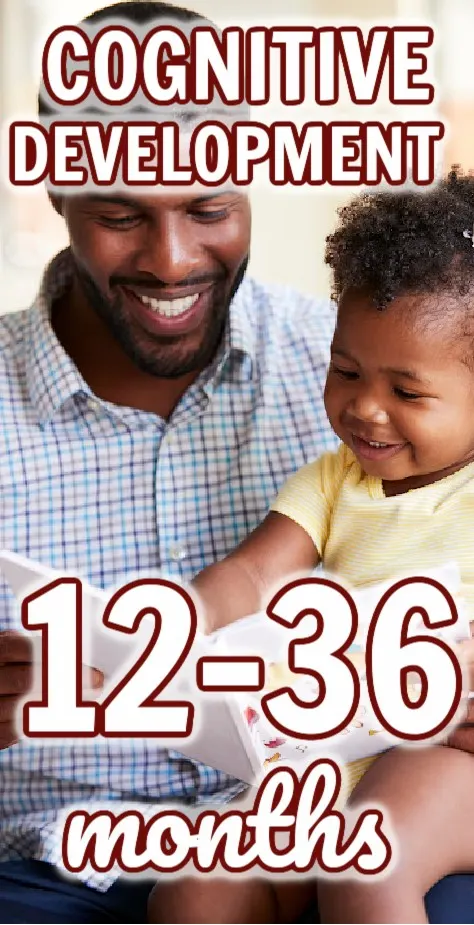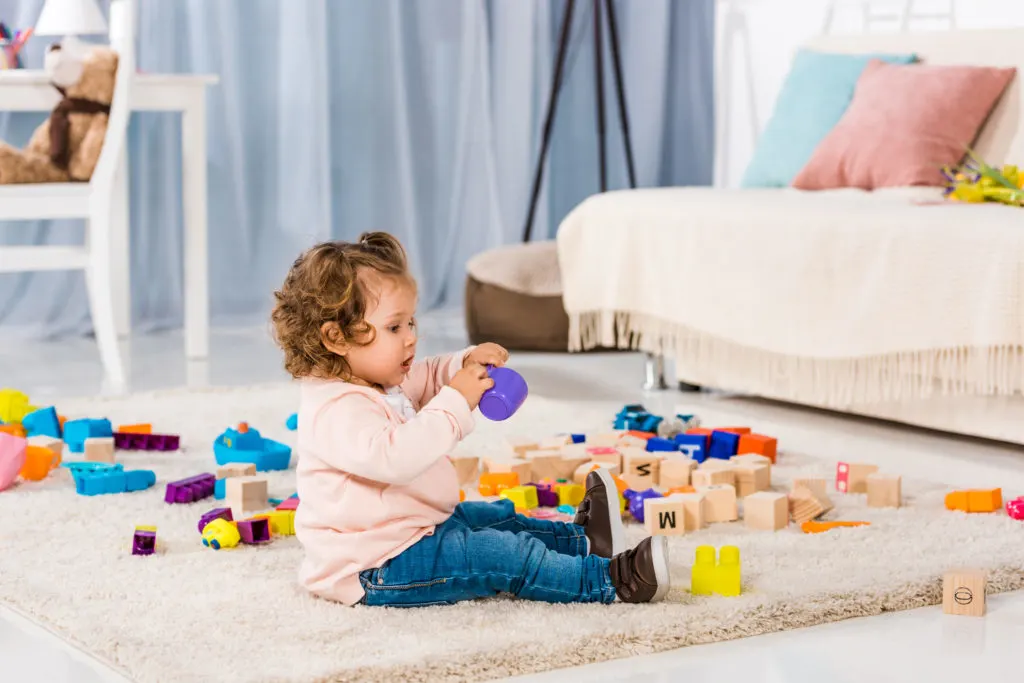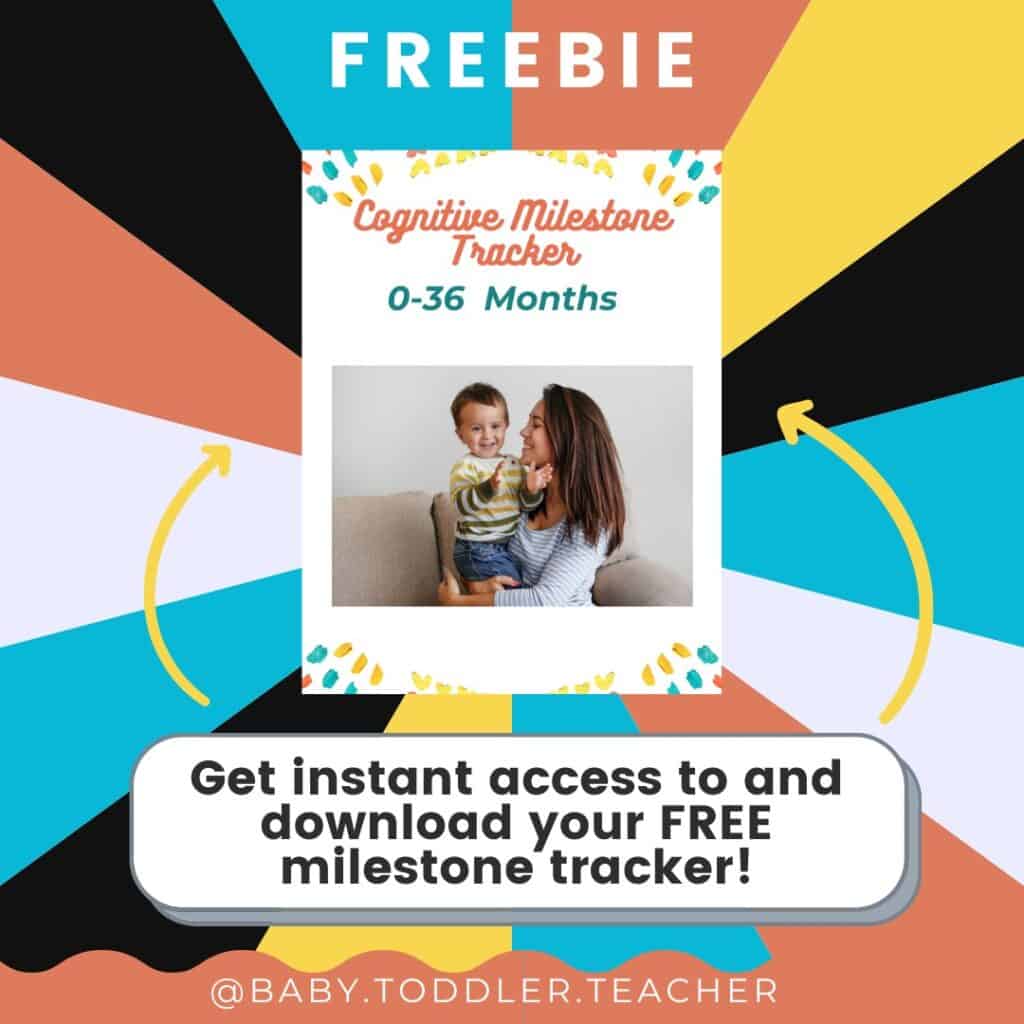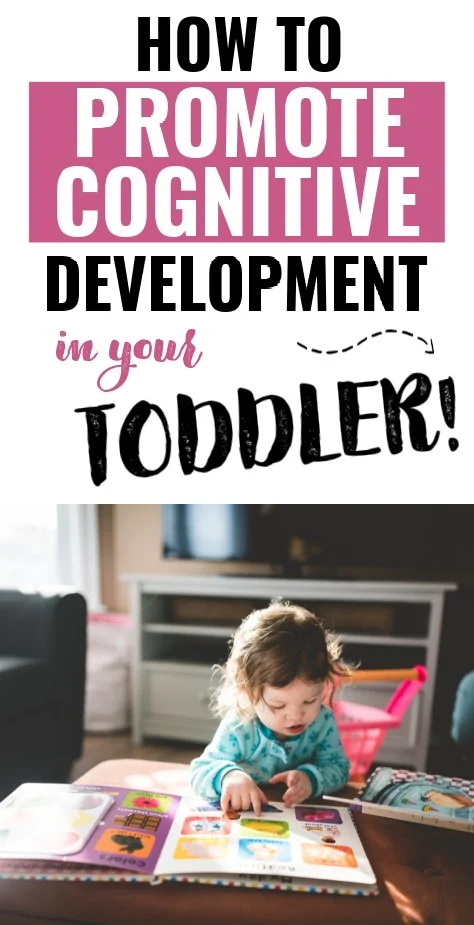Toddlerhood is a magical time in your child’s life.
They’re learning new things every day and you can help them to maximize these opportunities by setting up routines for playtime, meal times, bedtime, and more!
In this blog post, we’ll walk through the cognitive milestones that toddlers experience from 12-36 months so that you know what to expect.
Keep in mind that all children develop differently and at their own pace.
If you ever are concerned about your child’s cognitive development, contact your pediatrician or early intervention for screening or evaluation.
As your child’s caregiver, it is up to you to provide a stimulating environment as well as plenty of opportunities for exploration and discovery.
We’ll also share some ways that you can encourage development with play-based activities so you can support your toddler’s cognitive development.
Toddlers’ Cognitive Development: What to Expect and How to Encourage It

This post contains affiliate links. To read our full disclosure policy click here.)
What is cognitive development in toddlers?
Cognitive development refers to the capability of a toddler to think, behave, and process information.
Toddlers must develop their thinking skills so they can make sense of new situations.
However, there are some cognitive milestones toddlers reach at different ages so it is important to know what stage your child might be in. This article will look at the 12-36 months.
How do toddlers develop cognitive skills?
Toddlers develop cognitive skills through play and the learning that naturally happens in their daily interactions and routines.
For example, they learn how to use objects and tools, interact with other children or adults, and become more skilled at drawing & painting through their experiences.
They also begin to understand the world around them through language – such as understanding what words mean and how to use them to solve problems and get their own needs met.
Cognitive Developmental Milestones 12-18 Months
Let’s take a look at some of the things children learn from about 12-18 months.
Their understanding of language (also known as receptive language) continues to grow.
You may notice your little one starts to follow simple one-step directions or requests such as “get your shoes.”
Your child’s ability to understand the words you are saying also continues to grow.
This will help them better explore their world and learn through new experiences.
You may find your toddler using more single words and gestures to communicate.
Pointing is also a frequent action as your toddler will start pointing at items that interest them or that they want.
Although their attention span is short they may also be interested in looking at picture books (like these).
They can help turn pages and are starting to recognize pictures in books that are read frequently.
As your toddler’s fine motor and problem-solving skills emerge they can put pieces into puzzles.
This will help with the development of hand-eye coordination.
Start with a simple puzzle and move to a more complex one as your child gains skills.
Your toddler is also finding new ways to explore their environments such as standing and walking and it takes problem-solving skills to navigate all of the new things they are encountering.
Cognitive Developmental Milestones 18-24 Months
Have you noticed your toddler has become quite curious?
It is very typical for children at this age to enjoy exploring cabinets and drawers so make sure you have toddler proofed well!
They will also have a good sense of cause and effect.
So if they slam the cabinet door, be ready for them to start giggling!
Your child is starting to understand more and more words which means they may be able to point to clothing items when named or some or their body parts.
Their book skills are improving as well so they may be able to turn one page at a time instead of multiple.
They may also be able to match animal sounds to pictures of animals.
Young children from 18-24 months are starting to get crafty and can use and explore paint and playdough while supervised.

Toddler Cognitive Development 24-36 Months
You may notice over the next few months your toddler is changing in many ways.
Young children learn and understand more pre-academic concepts such as sorting shapes and being able to identify some opposites such as big/small.
They may be able to do more and more things such as starting to be able to match colors and shapes.
They are now getting the hang of following more complex directions, some with 2 steps.
Toddlers may also start to understand the meaning of more nouns and also action verbs.
Before they turn three they will start to learn adjectives and some prepositions as well.
Now your child may be able to identify more body parts with their function as well.
Your child’s interests may include books, singing, and make-believe play.

How to Encourage Toddler Cognitive Development 12-36 Months
Now that you know what milestones your child is working on, you can encourage their development through play and daily routines.
Play can help your toddler develop cognitive, social, physical skills by providing opportunities for them to learn while playing with other children or on their own in a safe environment.
Encourage your little one to explore toys such as blocks, puzzles, dolls (or any age-appropriate toy) Click here to see examples.
First, give your child the opportunity to explore the toy on their own.
Stand back and be an observer!
If they seem to be getting frustrated, you may need to model for your child how to use the toy and see if they will imitate you.
Another great way to support their development is by including them in daily routines such as cooking, cleaning with supervision, or caring for pets.
My Inspire Learning for Toddlers online course guides you through child development as well as gives you ideas and strategies to support learning through play and daily routines with my inspire learning calendars.
Get More Support on Your Parenting Journey
Now that you know what cognitive development looks like for toddlers, it’s time to start thinking about the ways in which your little one will continue to grow and learn.
Join my community of mindful parents as we discuss all things related to raising a happy and healthy child from 0-36 months old!
Frequently Asked Questions
Cognitive milestones include the skills your child needs to navigate their world and process information such as: following simple instructions, solving problems, being able to participate in simple make-believe games and play, and other pre-academic skills such as sorting shapes and colors, imitating simple songs, and nursery rhymes and other skills that help your child learn.
You can encourage toddler development in very young children by giving them opportunities to play and encourage learning through daily routines. Children learn so much by watching their parents so including them in tasks like shopping and daily chores can be very beneficial.
Cognitive development begins in infancy as your baby learns through several senses including sight, touch, and sound.
From the time your little one is born they start using cognitive skills to figure out how the world works around them.
Related Posts You Will Enjoy
Gifts for Toddlers that aren’t Toys!
Top 2 Year Sleep Regression Tips
Easy Activities Toddlers Can Do On Their Own
Tips for Biting Toddlers that You Need to Know!
3 Things You Did Not Know Were Part of Typical Child Development


Kayla O’Neill has a master’s degree in education as well as a bachelor’s degree in special education with an emphasis in early childhood education. She has been working as a developmental therapist with babies and toddlers in early intervention since 2012. She is also a mom with two young children.